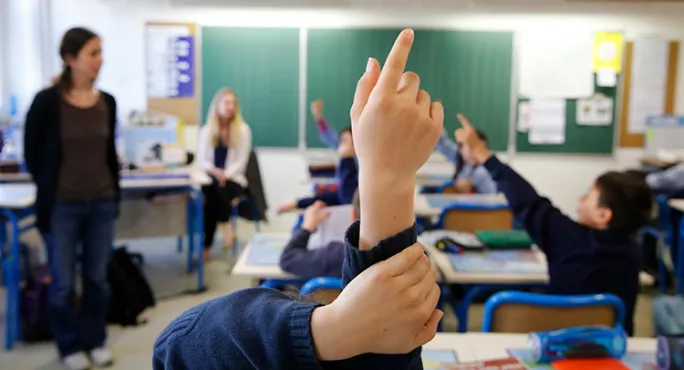- Home
- Sats for seven-year-olds to be scrapped from 2023
Sats for seven-year-olds to be scrapped from 2023

Tests for six- and seven-year-olds will become non-statutory from 2023, the Department for Education announced today.
The government will also introduce a “teacher-mediated” assessment in Reception to act as a starting point, or baseline, for school progress measures from 2020.
The requirements to submit reading and maths assessments in key stage 2 will also be removed to reduce workload.
Education secretary Justine Greening said: “A good primary education lays the foundations for success at secondary school and beyond.
“This year’s key stage 2 results showed our curriculum reforms are starting to raise standards and it is vital we have an assessment system that supports that.”
She added: “These changes will free up teachers to educate and inspire young children while holding schools to account in a proportionate and effective way.”
The government confirmed that it will:
- Introduce a new teacher-mediated assessment in the Reception year from 2020 to provide a baseline measure to better track pupils’ progress during primary school. The check, which will be developed in conjunction with the teaching profession, will ensure schools are given credit for all the work they do throughout a child’s time at primary school;
- Improve the early years foundation stage profile - a check on a child’s school readiness at the end of their early years education. This includes reviewing supporting guidance, to reduce the burden for teachers;
- Make KS1 tests and assessments non-statutory from 2023 and remove the requirement for schools to submit teacher assessment data to the government for reading and maths at the end of KS2, as these subjects are already assessed through statutory tests, from 2018-19;
- Introduce a multiplication tables in year 4 check to aid children’s fluency in maths from 2019-20;
- Improve teacher assessment of English writing by giving teachers greater scope to use their professional judgement when assessing pupils at the end of KS1 and 2 from the current academic year (2017-18).
Nick Brook, deputy general secretary of school leaders’ union NAHT, said: “Today the government has confirmed that, from this year, teachers will once again be able to apply professional judgement when assessing pupils’ writing.
“Teachers and school leaders have argued strongly that sufficient flexibility to properly recognise pupils’ achievements was needed. This move is a welcome step in the right direction.
“The decision to make SATs for seven-year-olds non-statutory in favour of a new Reception baseline assessment may well be met with trepidation by some, but it is absolutely the right thing to do.
“Under current accountability arrangements, the hard work and success of schools during those critical first years is largely ignored.
“If designed properly, these new assessments can provide useful information for schools to help inform teaching and learning, while avoiding unnecessary burdens on teachers or anxiety for young children.
“We intend to work with government to ensure that this is exactly where we end up. Taken together, these measures are a big step in the right direction.”
The government has also set out how it will better support children who are not yet working at the standard of the national curriculum tests.
The changes, which follow a consultation on the findings of the independent Rochford Review, will ensure there are appropriate assessment arrangements in place, and there will be a pilot of a new approach to assessing the attainment of children with the most complex special educational needs.
The proposal to scrap KS1 tests is linked to a return of baseline assessment for children when they start in Reception class at age 4.
A Reception-year baseline assessment will be used to measure children’s progress between the start of school and the end of KS2 - currently, children’s progress is measured between the end of KS1 and the end of KS2.
But a previous attempt to introduce a baseline assessment was scrapped in April 2016 after a study found the three different methods, from which schools could choose, were not comparable.
And the policy remains controversial. While the NAHT gave it cautious support, saying in its reponse that the assessment should not include tests of four-year-olds, there has been widespread opposition among classroom unions and early years organisations. The ATL teachers’ union (now part of the NEU) said in its consultation response that a baseline assessment would place “unacceptable strain” on Reception-year teachers.
The consultation on primary assessment was launched in March this year following the chaotic introduction of the new Sats in 2016 when papers were leaked, writing assessments were inconsistent and children left in tears over a tough reading paper.
These experiences had prompted the NAHT, NUT and ATL unions to threaten a boycott of Sats in 2017 unless significant changes were made - including addressing concerns about the use of “secure fit” rather than “best fit” on the writing assessment.
In October 2016, the government announced that it would be putting forward proposals for consultation and confirmed that no schools would be forced into academisation on the basis of the 2016 data alone - something which has been continued this year.
Want to keep up with the latest education news and opinion? Follow Tes on Twitter and like Tes on Facebook
Keep reading for just £1 per month
You've reached your limit of free articles this month. Subscribe for £1 per month for three months and get:
- Unlimited access to all Tes magazine content
- Exclusive subscriber-only stories
- Award-winning email newsletters



